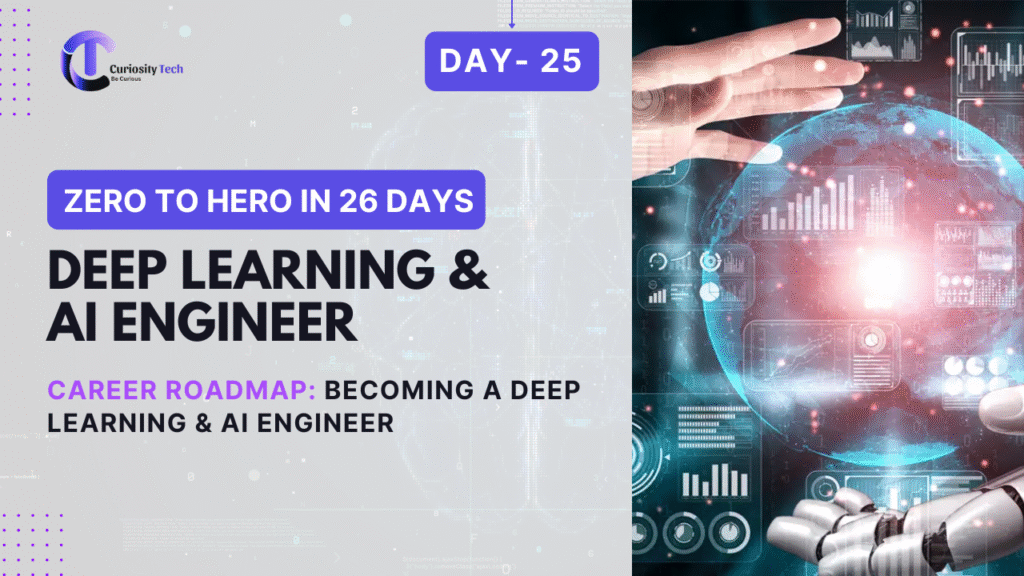Introduction
Becoming a Deep Learning and AI Engineer requires a structured blend of technical knowledge, hands-on experience, and industry exposure. In 2025, employers are looking for candidates who can design, train, deploy, and optimize AI models across domains.
At CuriosityTech.in, learners in Nagpur follow a systematic roadmap that combines foundational skills, advanced deep learning techniques, real-world projects, cloud deployment, and career-building strategies, preparing them to excel in competitive AI roles.
1. Foundation Phase
Skills to Acquire
- Mathematics: Linear algebra, probability, statistics, calculus
- Programming: Python, NumPy, pandas
- Machine Learning Basics: Regression, classification, clustering, decision trees, SVMs
Practical Activities
- Implement simple ML models on datasets like Iris, MNIST
- Analyze data preprocessing techniques and feature engineering
CuriosityTech Insight: A strong foundation ensures smooth progression to deep learning architectures and problem-solving in real-world projects.
2. Deep Learning Mastery
Skills to Acquire
- Neural Networks: Perceptron, MLPs
- CNNs: For image recognition and object detection
- RNNs & LSTMs: For sequential data and NLP tasks
- GANs & Autoencoders: For generative AI and anomaly detection

Practical Activities
- Build image classifiers using CNNs
- Implement text generation or sentiment analysis with RNNs/LSTMs
- Create simple GANs for generating synthetic data
Portfolio Tip: Document model architecture, training process, hyperparameter tuning, and evaluation metrics for each project.
3. Cloud & Deployment Skills
Platforms
- Google Vertex AI – training, deployment, monitoring
- AWS AI & SageMaker – scalable model hosting and API integration
- Azure Cognitive Services – NLP, CV, and conversational AI deployment
Practical Activities
- Deploy a trained model on cloud platforms with REST API endpoints
- Monitor model performance in production using cloud dashboards
Observation: CuriosityTech learners see the impact of cloud deployment on scalability and real-world AI applications, which is highly valued by employers.
4. Advanced & Specialized Skills
- Transformers & LLMs: ChatGPT, BERT, GPT-4, Vision Transformers
- Reinforcement Learning: Deep Q-Learning for autonomous systems
- Robotics & Edge AI: TinyML, embedded AI for IoT devices
Practical Activities
- Implement a Vision Transformer for image classification
- Train an RL agent in a simulated environment (CARLA or PyBullet)
- Deploy a model on Raspberry Pi or Jetson Nano for real-time inference
CuriosityTech Tip: Advanced projects differentiate candidates in interviews and competitive roles.
5. Portfolio Development
Steps to Build an Impressive Portfolio
- Diverse Projects: Include NLP, CV, RL, generative AI
- Cloud Deployment: Show models running on cloud platforms
- Edge AI Projects: Demonstrate real-time inference on devices
- Documentation & Reporting: Include architecture diagrams, code samples, evaluation metrics
- Version Control: Use GitHub or GitLab for code sharing and collaboration

Human Story: A learner at CuriosityTech built a portfolio with 5 major projects: sentiment analysis, autonomous driving simulation, GAN-based image generation, cloud-deployed CV model, and edge AI deployment. This portfolio helped them secure multiple AI engineering interviews and job offers.
6. Career Strategy
Recommended Steps
- Certifications: TensorFlow, AWS ML Specialty, Azure AI Engineer
- Networking: Join AI communities, forums, and LinkedIn professional groups
- Internships & Freelance Projects: Gain real-world experience
- Continuous Learning: Stay updated with papers, open-source projects, and AI research

Job Roles
- AI Engineer, Deep Learning Engineer, ML Engineer
- NLP Specialist, Computer Vision Engineer
- Robotics AI Developer, Autonomous Systems Engineer
CuriosityTech Insight: Learners who combine certifications, hands-on projects, cloud deployment, and ethical AI practices are highly competitive in 2025 AI job markets.
7. Recommended Learning Timeline
| Phase | Duration | Focus |
| Foundation | 2-3 months | ML basics, Python, mathematics |
| Deep Learning Mastery | 4-6 months | CNNs, RNNs, LSTMs, GANs |
| Cloud & Deployment | 2-3 months | Vertex AI, AWS, Azure |
| Advanced Specialization | 3-4 months | Transformers, RL, Edge AI |
| Portfolio & Career Prep | 2-3 months | Projects, certifications, interviews |
Conclusion
Becoming a Deep Learning & AI Engineer in 2025 requires a structured roadmap combining foundational knowledge, deep learning expertise, cloud deployment skills, advanced specializations, and portfolio building. At CuriosityTech.in, learners follow this roadmap, gaining hands-on experience, certifications, and career guidance, ensuring they are well-prepared for high-demand AI roles across industries.



